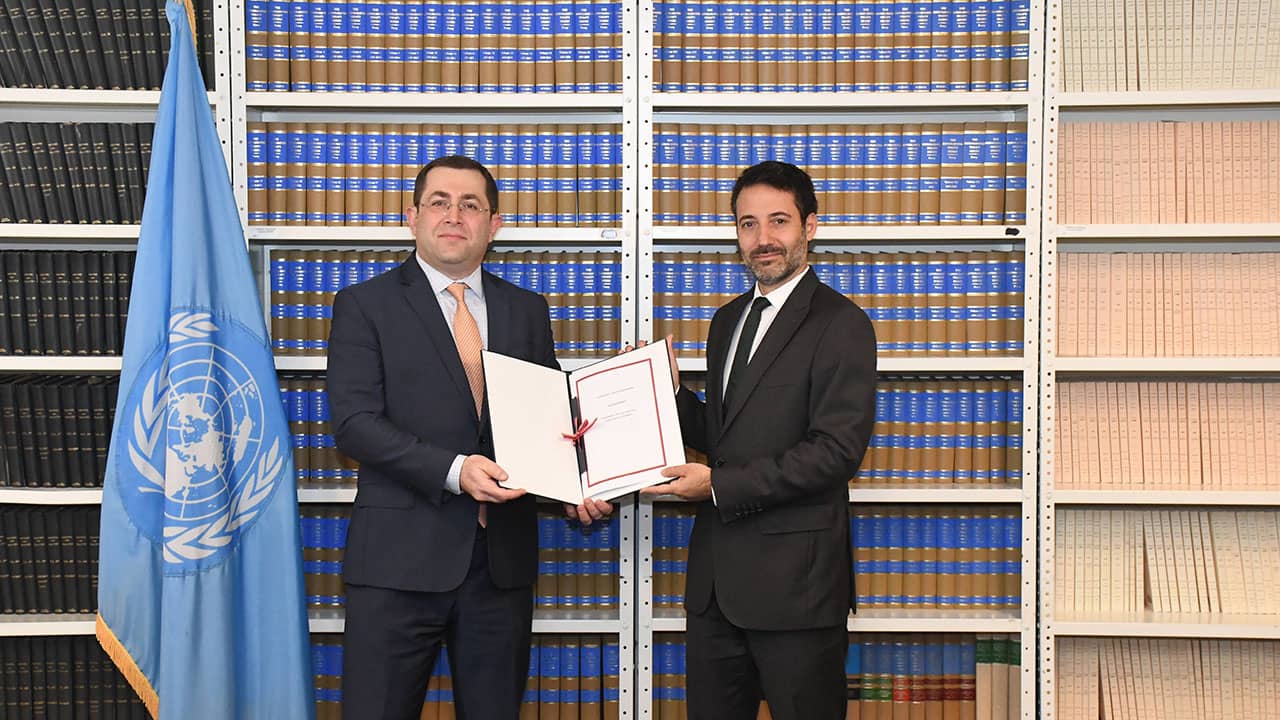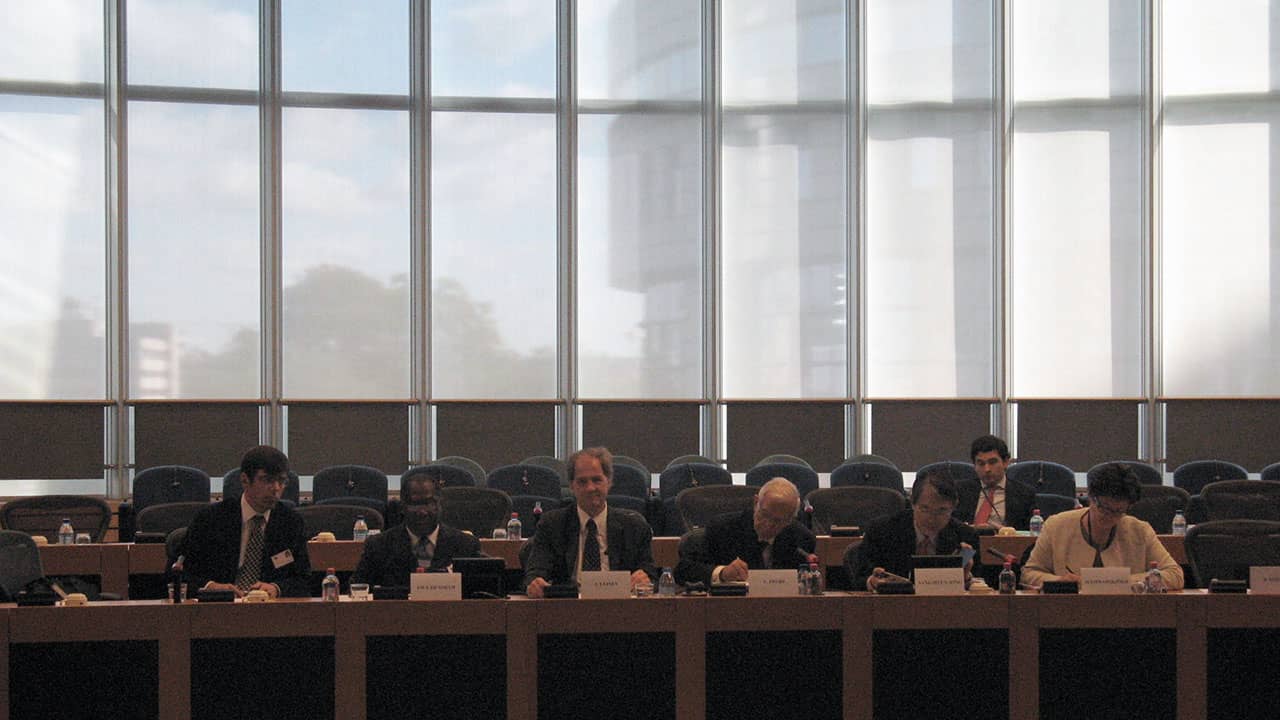
Rome Statute
Armenia signed the Rome Statute on 1 October 1999. On 14 November, 2023, Ambassador Mher Margaryan deposited Armenia’s instrument of ratification to the Rome Statute of the International Criminal Court, with Armenia becoming the 124th State Party to the ICC.
Kampala Amendments
Armenia has not ratified the Kampala Amendments of 2010.
Implementing legislation
In 2003, Armenia enacted partial implementing legislation, which incorporates some of the ICC crimes, which include genocide, serious breaches of international humanitarian law during armed conflicts (war crimes), and ‘crimes against human security’.
Agreement on Privileges and Immunities (APIC)
Armenia has yet to acceded to the APIC.
Additional Agreements
Armenia signed a Bilateral Non Surrender Agreement with the USA on 16 October 2004.
Progress towards Ratification
In 2004, the Armenian Constitutional Court ruled that the Statute was partially incompatible with the Armenian constitution and could not be ratified. The ruling affirmed that the ICC would supplement the Armenian national judicial system, hence requiring an amendment to the Constitution that would address the matter of judicial sovereignty (Articles 91, 92) and the rather hypothetical matter of the discretional authority provided to the President to pardon convicted persons.
In the 2006, within the framework of the Action Plan within the EU European Neighbourhood Policy, the Government of Armenia committed to initiate the process of ratifying the Rome Statute and to make the necessary legislative and constitutional amendments.
A constitutional review, which begun in 2013, could have paved the way for necessary amendments to allow for ratification. In March 2015, the president approved a reform strategy that could have provided for such amendments. Regretfully, as recently as in November 2015, the President decided not to include in his proposal to reform the Constitution an "ICC-clause", which had been drafted by the Constitutional Reform Commission that was tasked with the mandate of preparing constitutional amendments in the year marking the 100 Anniversary of the genocide. As of early 2016, the Armenian ratification process of the Rome Statute appears blocked.
As reported by an NGO representative who addressed the EU-CICC side-event during the November 2015 session of the Assembly of States Parties to the Rome Statute of the ICC, the President of Armenia decided not to send to Parliament the constitutional amendment on the ICC that the Executive had requested a Special Commission to draft in 2014. Information available to PGA shows that the President may have mistakenly calculated that Armenia's ratification of the Rome Statute would give a 'tactical' advantage to neighboring States not entertaining friendly relations with Armenia. This assertion seems misguided, due to the fact that the Rome Statute's ratification is aimed at reinforcing the protection for the civilian populations against the perpetration of the most serious crimes of international concern regardless of the nationality of the perpetrators.
PGA Action
In May 2015, PGA Member Mr. Harry von Bommel, MP, of the Netherlands, conducted an official visit of the Standing Committee for Foreign Affairs of The Netherlands to Yerevan in order to pursue the topic of EU-Armenian friendly relations. While in Armenia, MP van Bommel was able to discuss the country’s ongoing process towards ratification of the Rome Statute with high-ranking officials including the Speaker of the Armenian Parliament, the Minister of Foreign Affairs, and other parliamentarians. In an interview with the PGA Secretariat, Mr. van Bommel underscored PGA’s deeply important role in equipping its members to engage and inform MPs about this topic, which would allow Armenia to give concrete meaning to its commitment to the 'never again'.
On 4 December 2015, PGA's Secretary-General addressed the conference on the 100 years of the Armenian genocide organized by the University of Teramo, Italy, under the direction of Prof. Emanuela Pistoia. In her key-note address, ICTY Judge Flavia Lattanzi stated that in 1915 genocide may not be qualified under the strict terms of the 1948 Convention, which may not be applied retrospectively to pre-World War II situations before relevant jurisdictions. Norms of customary international law concerning "crimes under International Law" crystallized themselves universally, in a very short time-frame, only after the end of World War II. The Judge however found that the facts of 1915 on the Ottoman Empire could have been easily fallen under the definition of genocide, should this type of crime have existed under international law at the time. Therefore, she found it more than appropriate for political bodies like Parliaments and Executives to recognize politically that genocide had occurred in Armenia during the year 1915.
As genocide and crimes against humanity were not prosecutable offenses in 1915, the PGA Secretary-General used the 1907 Hague Convention on the law and customs of war and the (never applied) 1919 Peace Treaty of Sevres to argue that the legal basis for reparations to victims’ descendants was provided by the law on "war crimes": In fact, the Ottoman Empire was a belligerent and the Armenians were seen also as an 'enemy-national-group', nationality being one the grounds for genocide under the 1948 Genocide Convention.
These legal interpretations were welcomed by all participants in the Conference, which provided an opportunity for PGA to level criticism on the regrettable decision of the President of Armenia not to transmit to Parliament the constitutional amendment on the ICC on the occasion of the 100 Years of the "Meds Yeghern" of the Armenians.
Human Rights Council Universal Periodic Review
Armenia was reviewed during the 21st session of the UPR in 201, where it received 20 recommendations to expedite its ratification of the Rome Statute and implement it into its domestic legislation. It took note of 13 recommendations, and accepted 7 of them, but Armenia has yet to take action in this regard.
In 2003 and 2004, Armenian MPs participated in the II and III session of PGA's Consultative Assembly of Parliamentarians for the ICC and the Rule of Law respectively held in New York and Wellington. In 2006, upon indication of PGA, the Chair of the Parliament's Foreign Affairs Committee participated in a seminar on universality of the Rome Statute organized by the Austrian rotating Presidency of the EU at Salzburg University.







